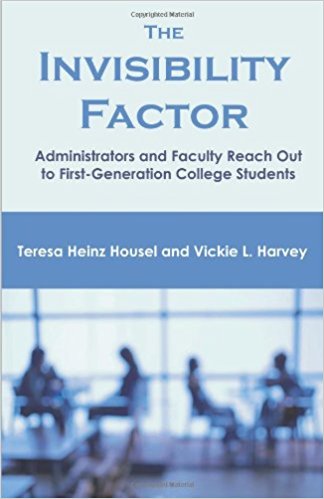Book Publications and Journal Issues
I write very little fiction now because my focus has shifted to academic and general non-fiction writing, such as editorials, features articles, blogs, and creative non-fiction. As an adult, I’ve written chapters for and co-edited academic books.
Though most of my writing is academic research now, I still haven’t forgotten those childhood books. One of my dreams is to write a few non-fiction books such as memoirs and history-related books. I no doubt have the fictional storyteller still in me, too.

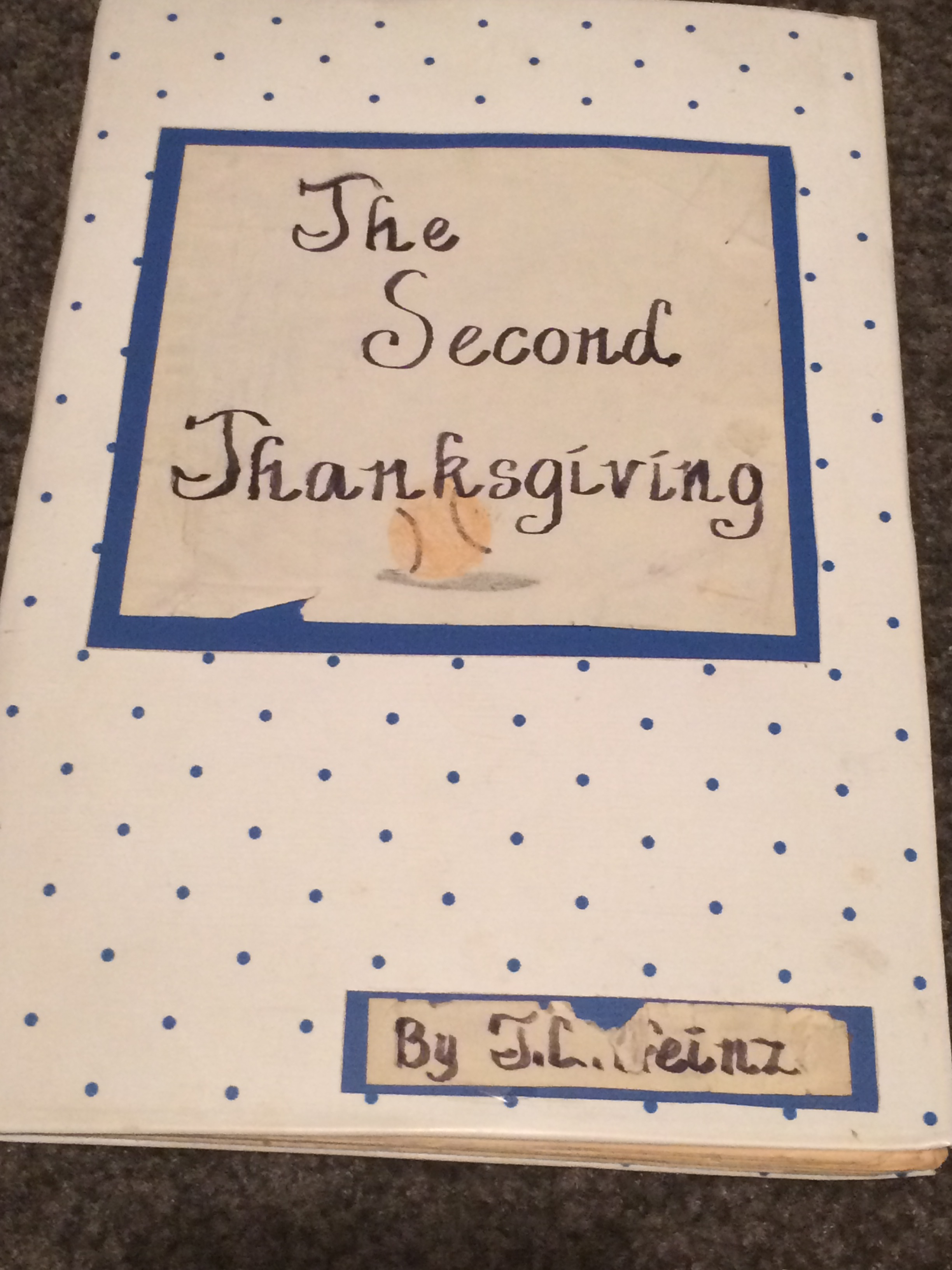

Forthcoming Book in 2021
My upcoming edited volume, Mental Health Among Higher Education Faculty, Administrators, and Graduate Students: A Critical Perspective (working title), will be published by Lexington Books in 2021 as part of its Studies in Health Communication Series.
My edited book responds to the acute need for research about mental health-related issues that impact faculty, administrators, and graduate students. The chapters collectively argue that a culture of silence historically surrounds mental health in an academic profession where not being able to cope with the rigors of research, teaching, and service is viewed as personal and professional weakness. As the book points out, the silencing stigma around mental health faces academics at institutions in the U.S. and other comparative countries.
The book’s sections (subject to slight revision) are:
- mental distress and mental illness in academic culture—factors leading to mental health challenges among academics; stigmatisation and misunderstandings around mental illness in academia; lack of person-centred communication about mental health
- stress, burnout, and mental health challenges among graduate students, adjunct employees, women
- rhetorical constructions of academics with mental illnesses in popular culture and academic press (such as the Chronicle of Higher Education)
- lack of cultural competence around mental health issues that impact marginalised academic populations such as people of colour, first-generation college students
- institutional policies on mental health and recommendations for best practices.
I believe that the timing is critical for this book’s publication. Academic researchers and journalists have examined the increase in mental health distress among undergraduates, but much less research covers those working at those institutions.
My Published Books and Journal Issues
Recent Book (2019)
My most recent book is First-Generation College Student Experiences of Intersecting Marginalities. Peter Lang published the book in 2019 as part of its Equity in Higher Education Theory, Policy & Praxis Series. I have edited the collection of essays from scholars in the field of first-generation college students, and have also written three content chapters, including my chapter, “If We Had Used Our Heads, We Would Be Set:” Intersections of Family, First-in-the-Family Status, and Growing Up in Working Class America.

Impact of Technology on Interpersonal Relationships
Special Edition of Electronic Journal of Communication, 26(3–4). Available at http://www.cios.org/www/ejc/v26n34toc.htm
Co-Editors: Teresa Heinz Housel and Vickie L. Harvey
This issue of the Electronic Journal of Communication is embedded in the context of scholars’ increasing attention to how technology affects interpersonal relationships through the ways people use and perceive technology, and interact through it.
The essays examine the intersections between technology and different aspects of interpersonal relationships. We broadly define technology to include social media and personal communications technologies such as cell phones, tablet computers, personal music players, and other devices.
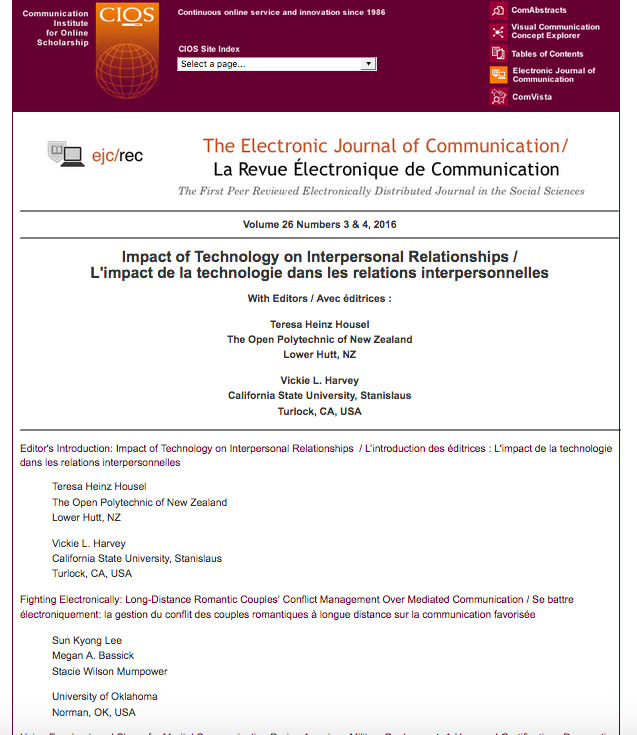
Health Care Disparities and the LGBT Population
Lexington Books, 2014
Vickie L. Harvey (Editor) – Teresa Heinz Housel
‘A must-read for someone teaching about diversity in health education.”(Online Reader Review)
This co-edited volume addresses a population of people whose lack of health care access, mistreatment in health care settings, and refusal of health care services are often omitted from discussions about health care disparities and insurance reform. The perspectives and needs of LGBT people should be routinely considered in public health efforts to improve the overall health of every person and eliminate health disparities.
Previous research suggests that LGBT people experience worse health outcomes than their heterosexual counterparts. Differences in sexual behavior account for some of these disparities, but others are associated with social and structural inequities. Low rates of health insurance coverage, high rates of stress due to systematic harassment, stigma, and discrimination, and a lack of cultural competency in the health care system frequently manifest in negative health-related behaviors.
The lack of data collection on sexual orientation and identity in state and federal health care surveys leads to inadequate information about LGBT populations and impedes the establishment of health programs and public policies that benefit them. This volume’s research will increase people’s understanding of the social and structural inequalities that LGBT populations experience. With its diverse perspectives, this book will not only benefit LGBT people, but will also more broadly improve the lives of entire communities, medical care, and prevention programs and services. Improvements to our country’s health care system should go beyond providing universal insurance and should ensure equitable health care for all.
Review of Book
The editors’ coverage of topics related to health disparities for sexual minority men and women is impressive. This comprehensive volume will be an essential resource for researchers and policy-makers, as well as health care providers and consumers, who are interested in understanding and ultimately reducing health disparities for the LGBT community. (Robin Lewis, Old Dominion University)
Reader Review of Book
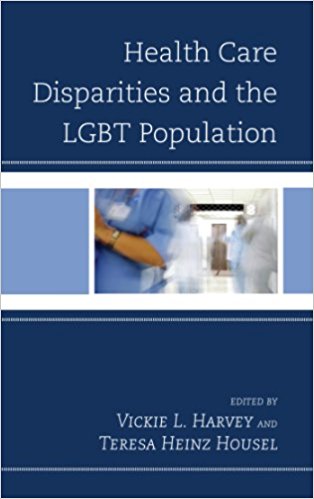
Faculty and First-Generation College Students: Bridging the Classroom Gap Together: New Directions for Teaching and Learning, Number 127 1st Edition
Jossey-Bass, 2011
Vickie L. Harvey (Editor) Teresa Heinz Housel (Editor)
Gain a greater understanding of the academic, cultural, and social experiences of first-generation college students (FGS). Fascinating, heart-touching, and important, the research and the stories presented here enlighten what FGS often have to overcome to successfully complete their degrees.
With an emphasis on improving FGS’ college success, retention, and graduation rates, this volume first covers common obstacles and the trend of FGS continuing on for graduate degrees. Section Two discusses the complex interplay of social, academic, emotional, and financial influences on academic performance. The chapters collectively affirm that the commitment of university resources is critical to college success.
This is the 127th volume of the Jossey-Bass higher education quarterly report New Directions for Teaching and Learning, which offers a comprehensive range of ideas and techniques for improving college teaching based on the experience of seasoned instructors and the latest findings of educational and psychological researchers.
Review of Book
The editors’ coverage of topics related to health disparities for sexual minority men and women is impressive. This comprehensive volume will be an essential resource for researchers and policy-makers, as well as health care providers and consumers, who are interested in understanding and ultimately reducing health disparities for the LGBT community. (Robin Lewis, Old Dominion University)
Reader Reviews:
“Purchased on the strength of a colleague’s recommendation: ‘A must-read for someone teaching about diversity in health education.” (Amazon Reader Review)
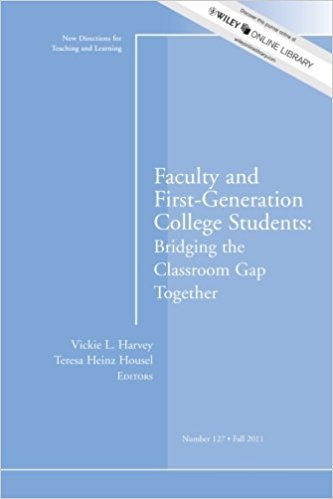
The Invisibility Factor: Administrators and Faculty Reach Out to First-Generation College Students
Brown Walker Press, 2010
Teresa Heinz Housel (Editor) – Vickie L. Harvey (Editor)
This collective volume fills an important gap in first-generation college student research by simultaneously achieving several important goals. Collectively, the essays represent a balance of personal narrative, qualitative, and quantitative approaches that extend our understanding of the first-generation college student (FGS) experience.
The essays review the existing literature on FGS; outline the barriers to college success faced by FGS; update the existing literature by introducing new and cutting-edge first-generation research; and recommend solutions to those in the trenches, who include support staff who design programs to support FGS.
The book’s contributing authors bring important personal and scholarly expertise to the project. The authors include faculty, administrators, support services personnel, and former students at private liberal arts colleges, major research universities, community colleges, and comprehensive universities in urban and rural settings. The diverse perspectives represented in the essays will benefit administrators and staff working at diverse types of institutions with FGS. In addition, many of the authors were first-generation college students. Socio-economic background profoundly shapes a person’s cultural transition into college and heavily determines what barriers to academic success he or she will face. This collection’s authors have a keen understanding of the FGS experience having made the transition into a foreign academic culture themselves.
The book’s essays address the following topics of concern of staff who interact with FGS:
- Understanding classism in the academy and class segregation on campus
- Race, ethnicity, class, and immigration as they impact FGS’ campus experiences
- Insight for developing successful first-generation support service programs
- FGS’ emotional, academic, and cultural adjustment to campus life
- The role of support groups in shaping the first-semester FGS college experience
- The importance of mentoring in aiding FGS’ cultural transition to college
- The impact of a FGS’ living situation (such as in a campus living-learning center) on academic and cultural transition
Reader Review of Book
